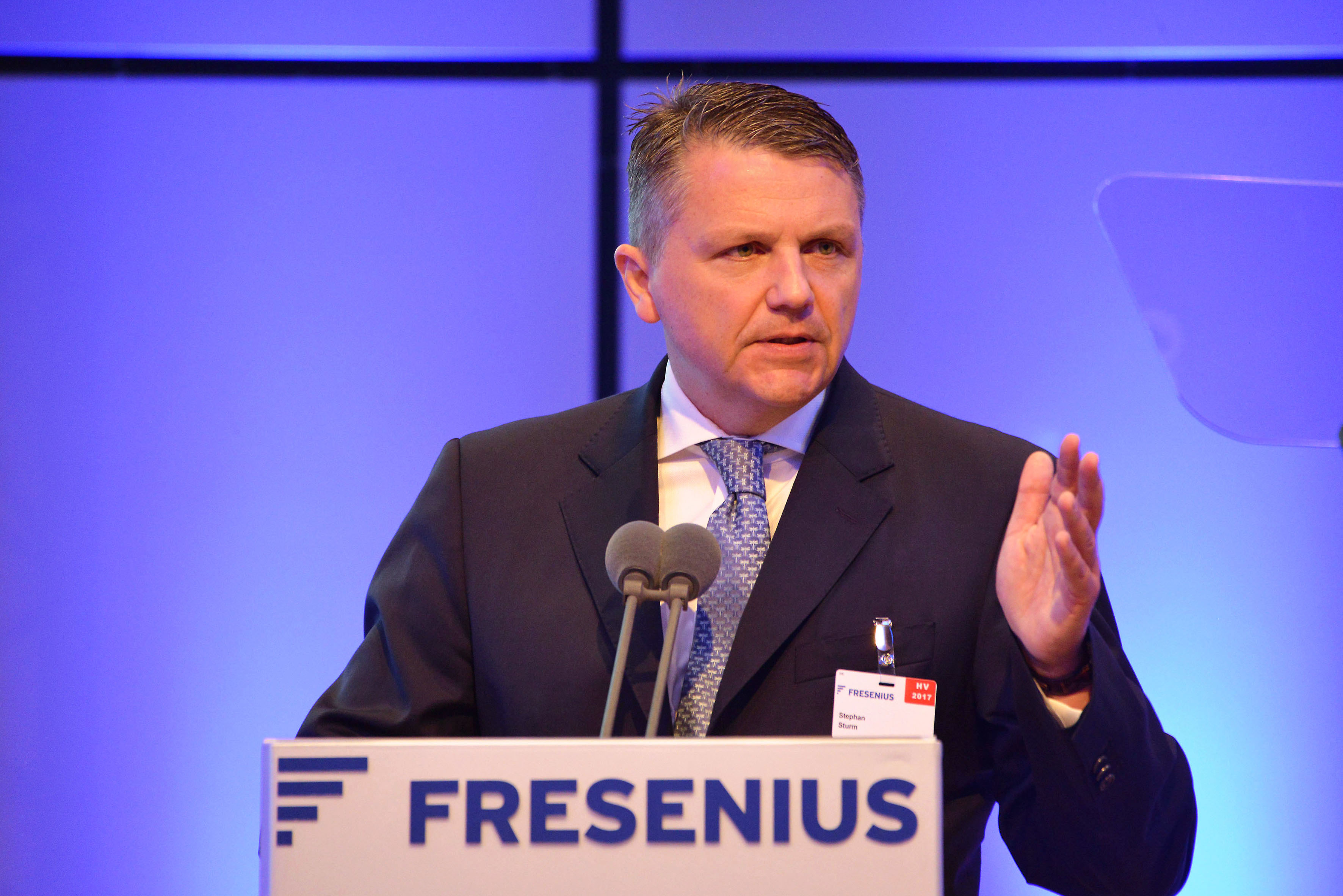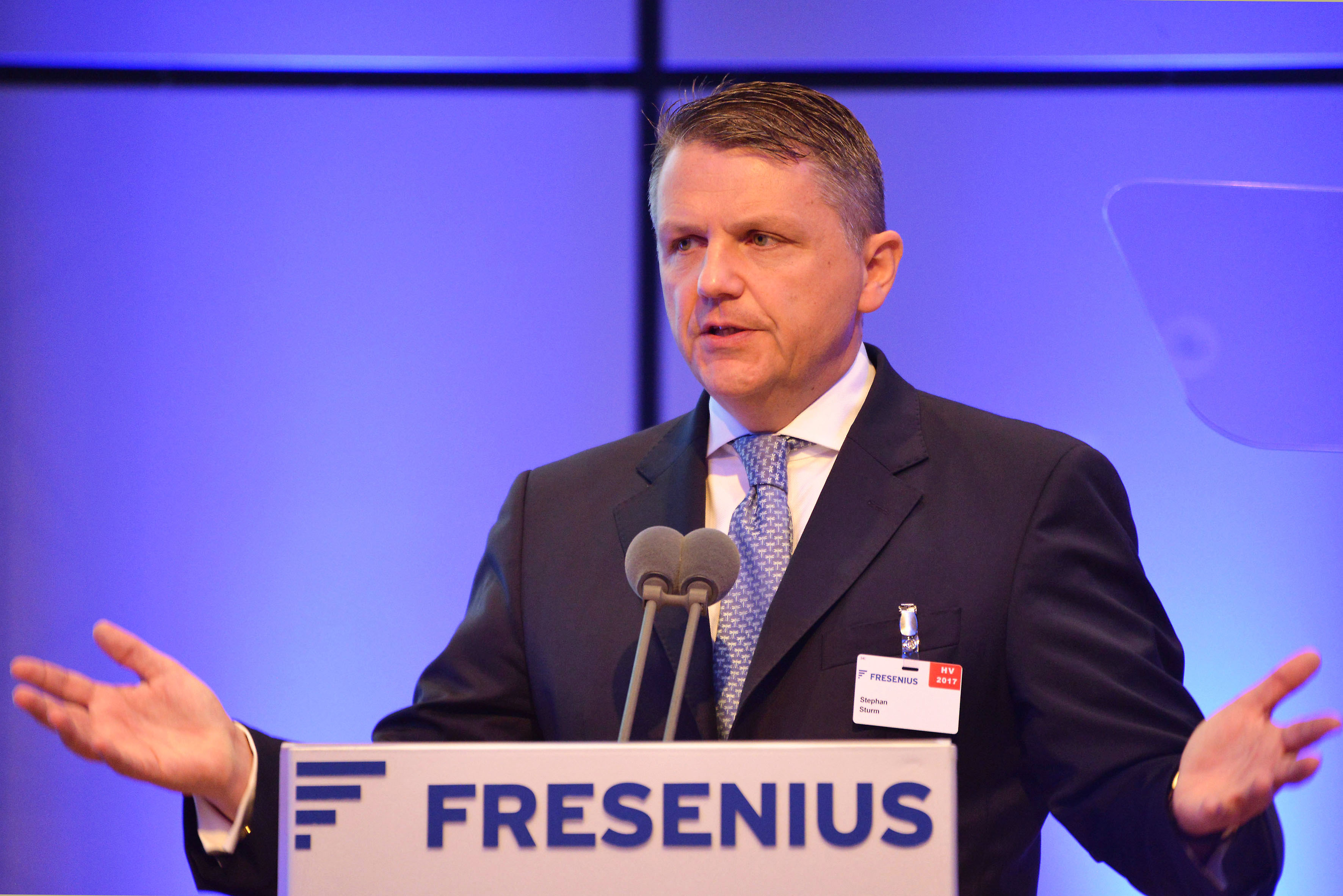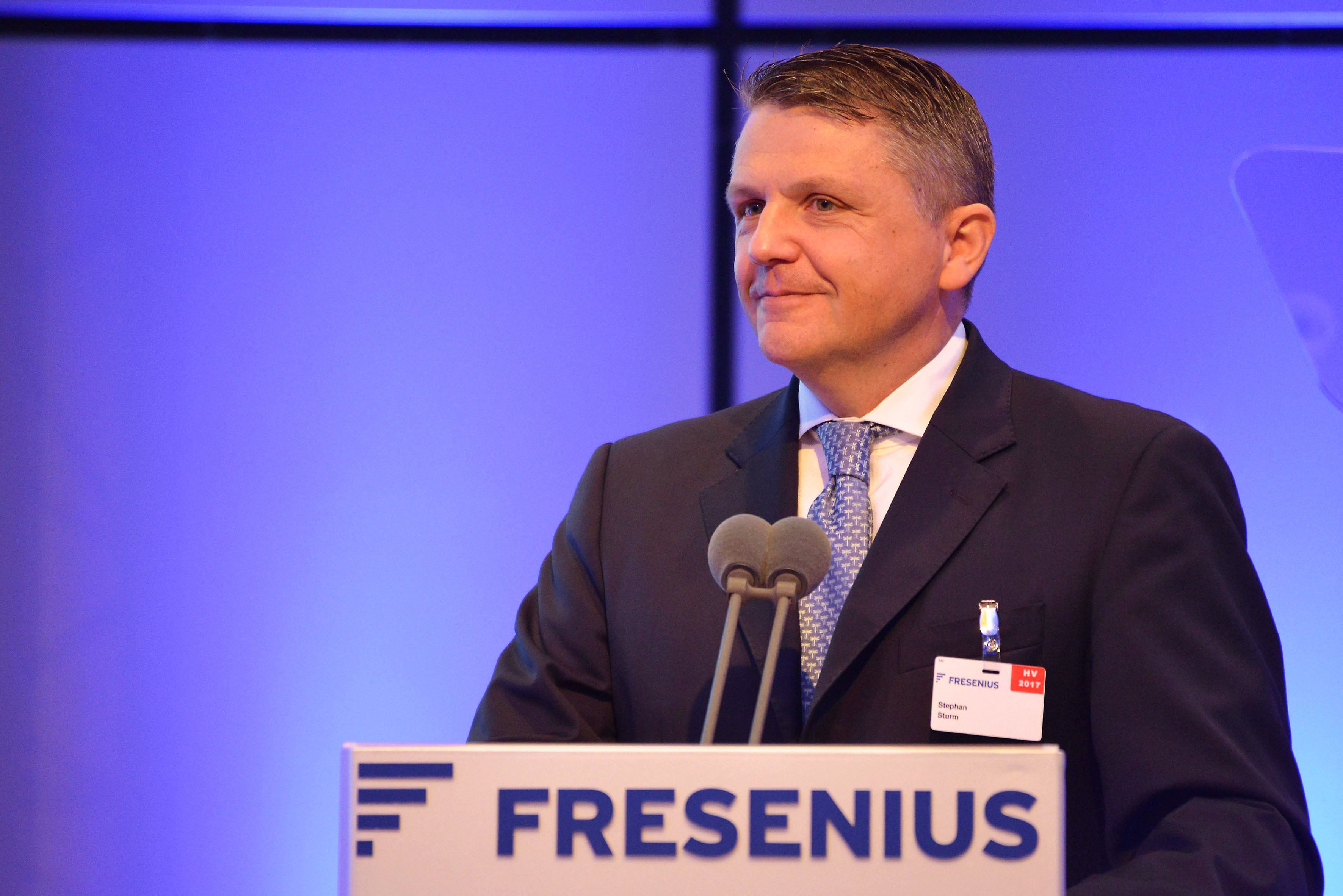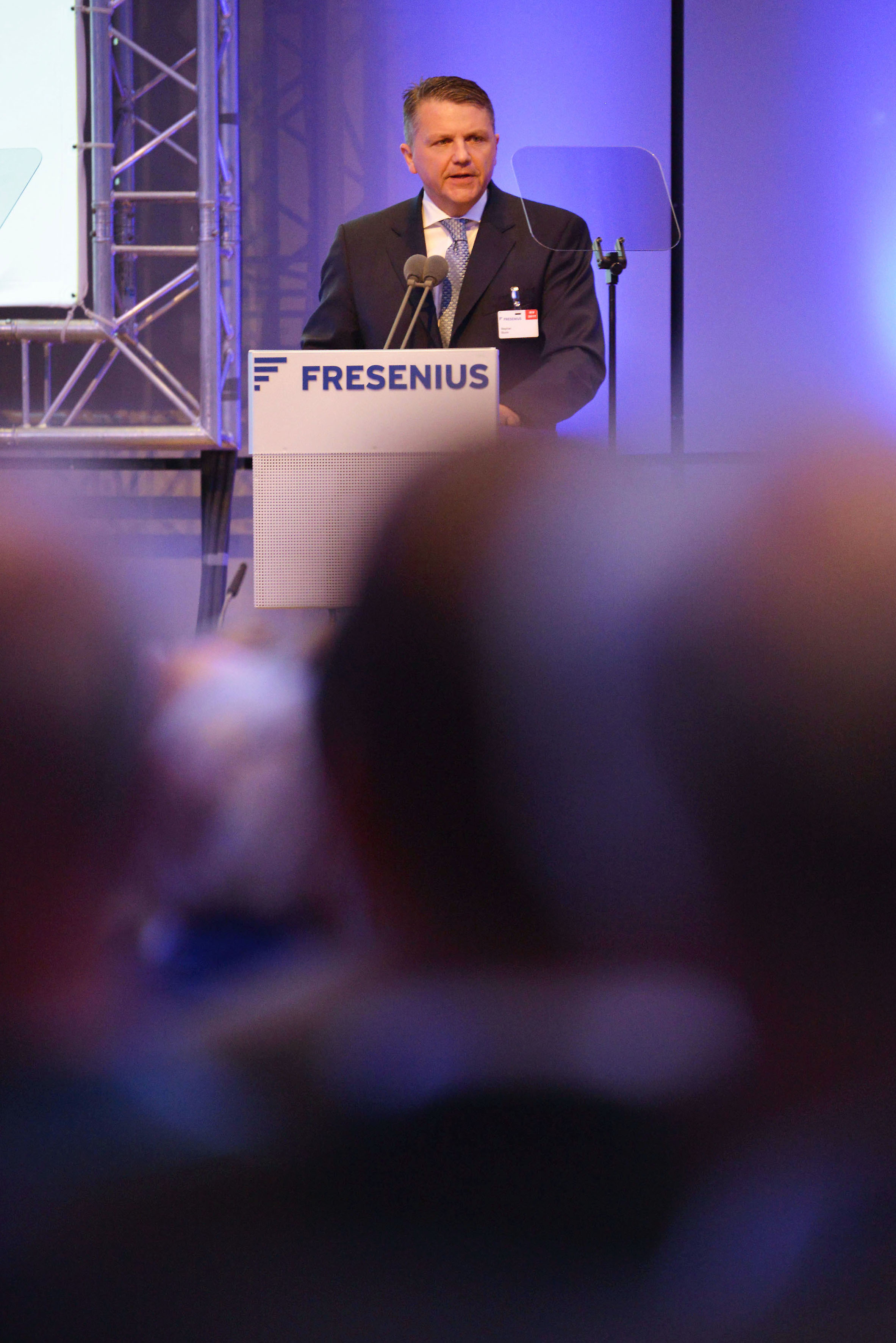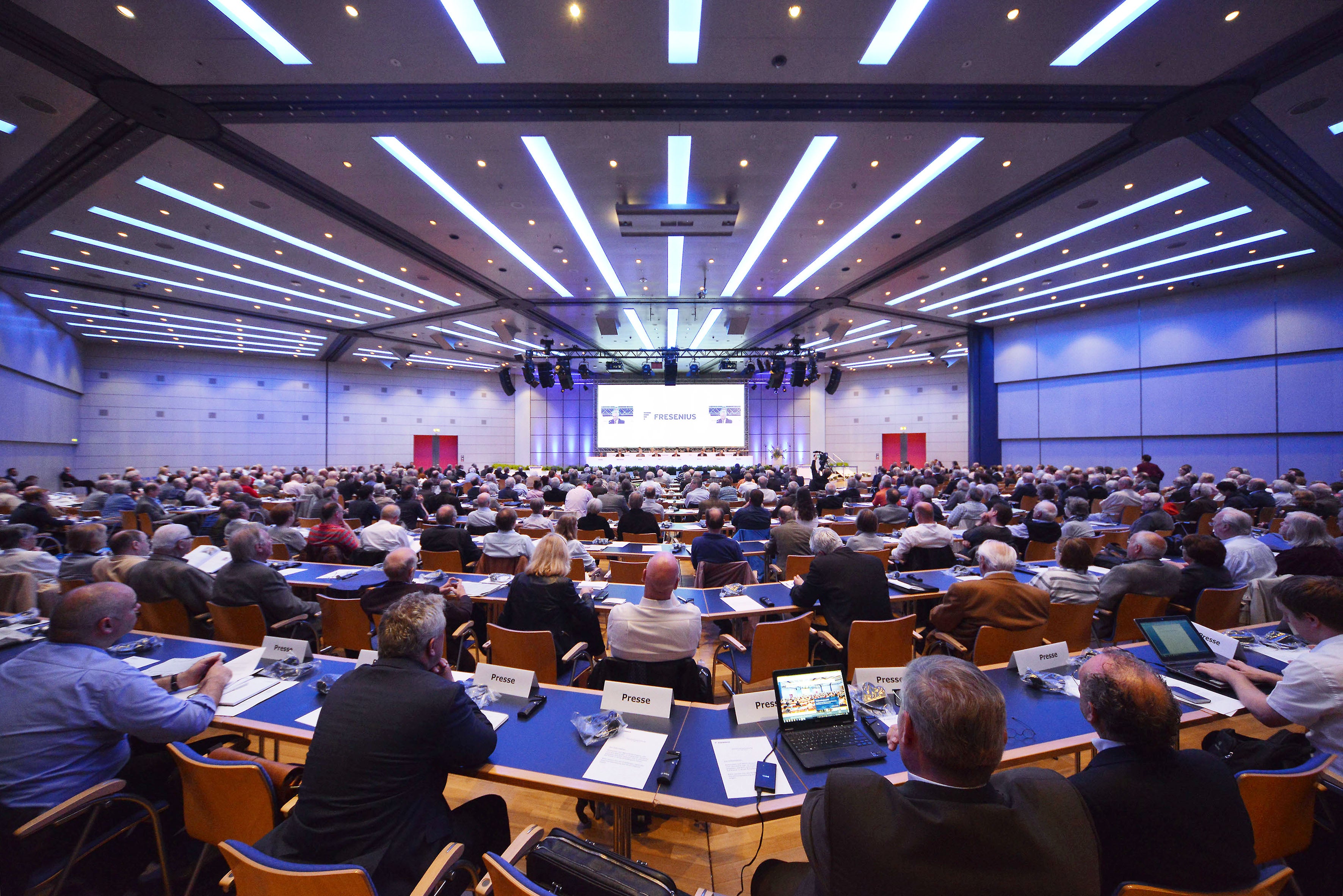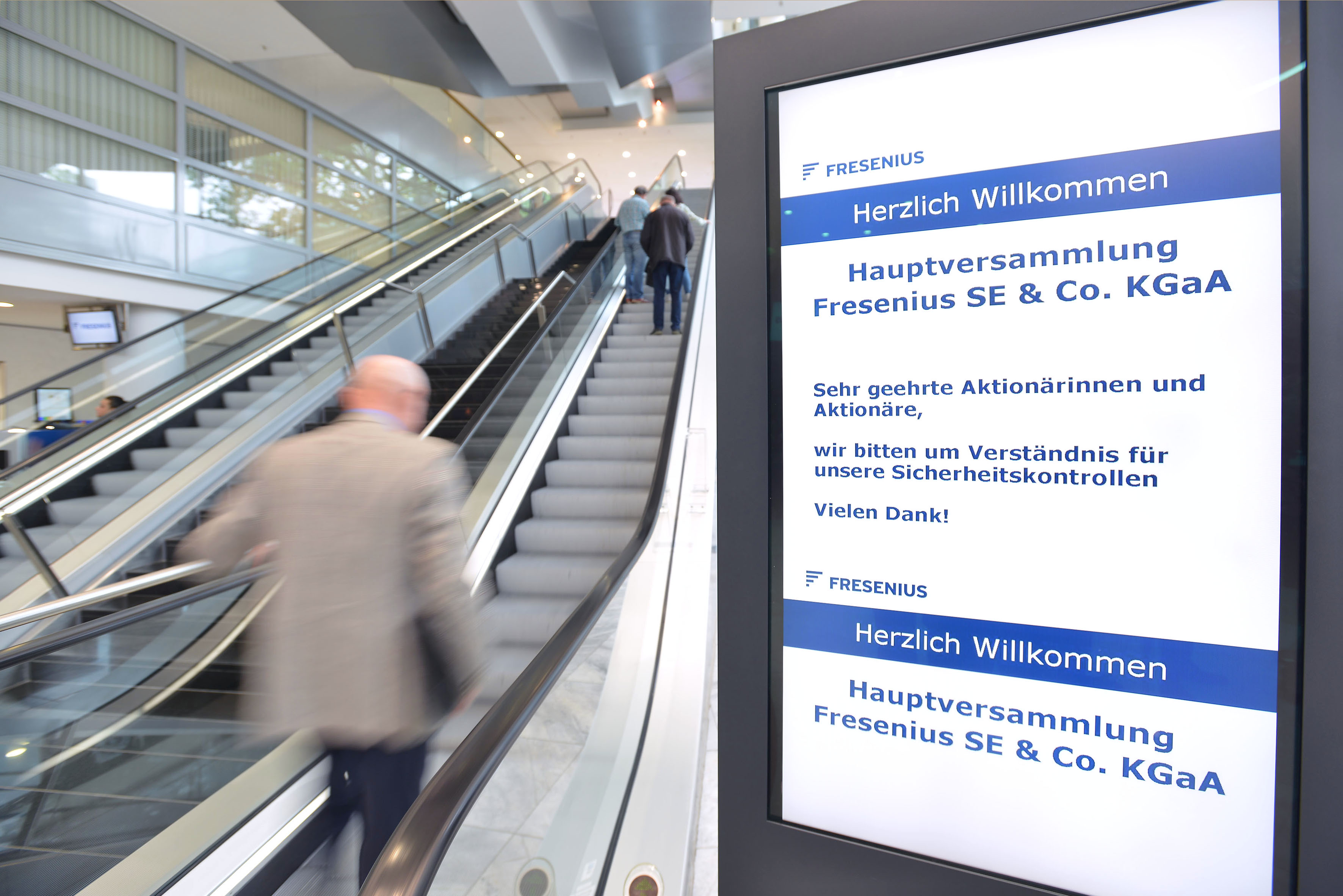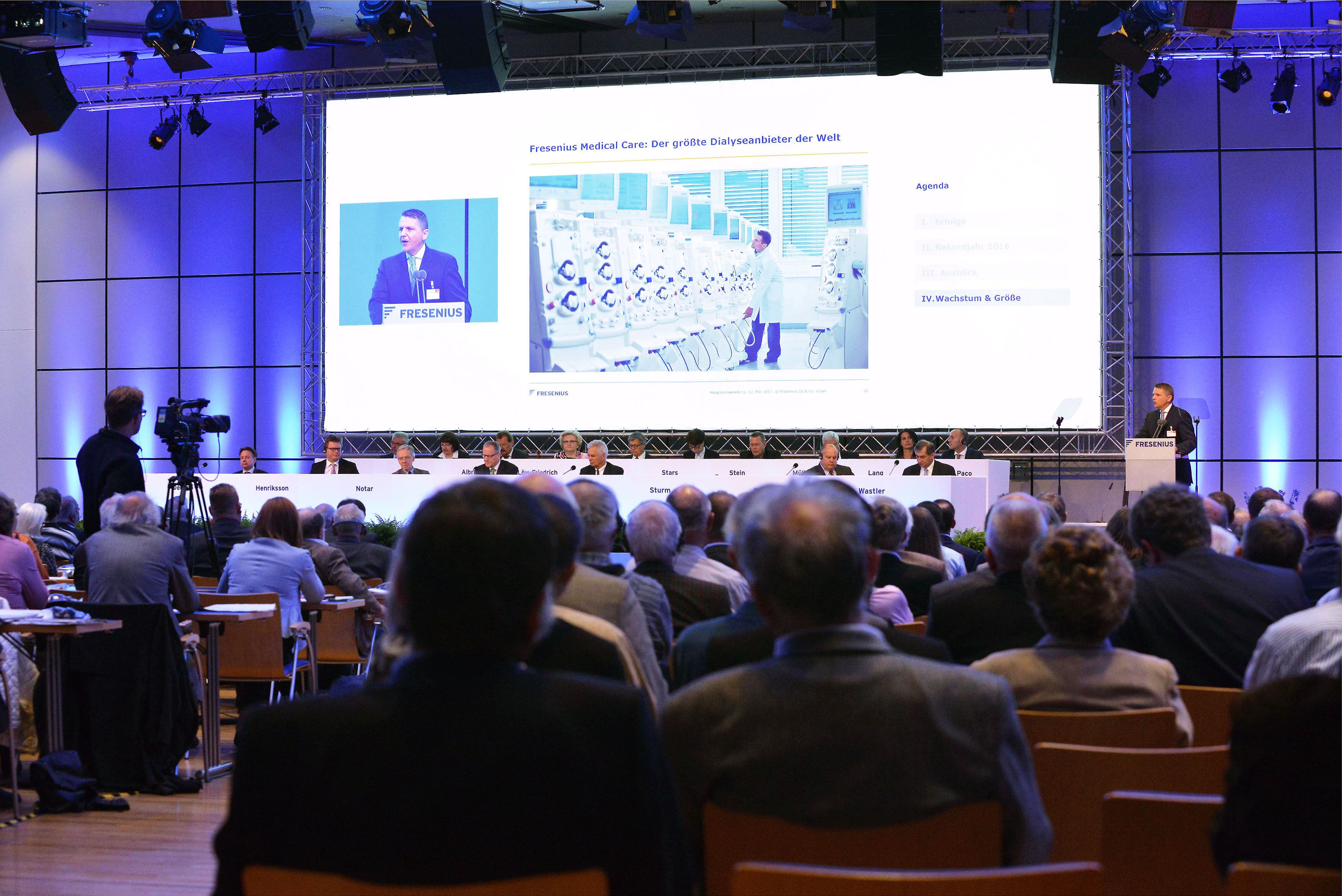If no timeframe is specified, information refers to H1/2017
Q2/2017:
- Sales: €8.5 billion (+18%, +17% in constant currency)
- EBIT1: €1,177 million (+14%, +13% in constant currency)
- Net income1,2: €459 million (+21%, +21% in constant currency)
H1/2017:
- Sales: €16.9 billion (+19%, +17% in constant currency)
- EBIT1: €2,393 million (+20%, +19% in constant currency)
- Net income1,2: €916 million (+24%, +23% in constant currency)
Stephan Sturm, CEO of Fresenius, said: “We were able to sustain our strong momentum also in the second quarter. Strong increases in sales and earnings have put us well on track to reach our full-year targets. We are very pleased with the business development of Quirónsalud while its integration into Fresenius is proceeding according to plan. A focus in the second half will be to close the acquisitions announced by Fresenius Kabi. Those will put our business on an even broader foundation for future growth.”
1 Before special items
2 Net income attributable to shareholders of Fresenius SE & Co. KGaA
2017 Group guidance confirmed
Fresenius confirms its guidance for 2017. Group sales are expected to increase by 15% to 17% in constant currency. Group net income1,2,3 is expected to grow by 19% to 21% in constant currency.
Pro forma the acquisitions of Akorn and Merck KGaA’s biosimilars business, the net debt/EBITDA4 ratio is expected to be approximately 3.3 at the end of 2017.
17% sales growth in constant currency
Group sales increased by 19% (17% in constant currency) to €16,894 million (H1/2016: €14,218 million). Organic sales growth was 6%5. Positive currency translation effects (2%) were mainly related to the appreciation of the U.S. dollar against the Euro. Acquisitions and the agreement with the United States Departments of Veterans Affairs and Justice at Fresenius Medical Care (“VA agreement”) contributed 11%. In Q2/2017, Group sales increased by 18% (17% in constant currency) to €8,532 million (Q2/2016: €7,203 million). Organic sales growth was 5%. Acquisitions contributed 12% while divestitures had no meaningful impact on sales.
1 Before transaction costs of ~€50 million for the acquisitions of Akorn, Inc. and Merck KGaA’s biosimilars business
2 Before expected expenditures for the further development of Merck KGaA’s biosimilars business of ~€50 million (expected closing Q3/17)
3 Net income attributable to shareholders of Fresenius SE & Co. KGaA
4 Calculated at expected FY average exchange rates for both net debt and EBITDA; before transaction costs of ~€50 million; excluding further potential acquisitions
5 Excluding effects of VA agreement
For a detailed overview of special items please see the reconciliation tables on page 15 in the PDF document.
Group sales by region:
23% net income2 growth in constant currency
Group EBITDA3 increased by 20% (18% in constant currency) to €3,098 million (H1/2016: €2,586 million). Group EBIT3 increased by 20% (19% in constant currency) to €2,393 million (H1/2016: €1,987 million). The EBIT margin3 increased to 14.2% (H1/2016: 14.0%). In Q2/2017, Group EBIT3 increased by 14% (13% in constant currency) to €1,177 million (Q2/2016: €1,028 million), with an EBIT margin3 of 13.8% (Q2/2016: 14.3%).
Group net interest reached -€326 million3 (H1/2016: -€291 million), mainly due to the financing of the Quirónsalud acquisition.
The Group tax rate increased to 28.5%3 (H1/2016: 28.3%), mainly driven by the higher proportion of U.S. pre-tax income, primarily due to the VA agreement. In Q2/2017, the Group tax rate was 27.9%3 (Q2/2016: 28.2%).
1 Including effects of VA agreement
2 Net income attributable to shareholders of Fresenius SE & Co. KGaA; before special items
3 Before special items
For a detailed overview of special items please see the reconciliation tables on page 15 in the PDF document.
Noncontrolling interest increased to €562 million (H1/2016: €480 million), of which 96% was attributable to the noncontrolling interest in Fresenius Medical Care.
Group net income1 increased by 24% (23% in constant currency) to €916 million (H1/2016: €736 million). The VA agreement increased net income1 growth by 2%-points. Earnings per share1 increased by 22% (21% in constant currency) to €1.65 (H1/2016: €1.35). In Q2/2017, Group net income1 increased by 21% (21% in constant currency) to €459 million (Q2/2016: €378 million). Earnings per share1 increased by 19% (19% in constant currency) to €0.82 (Q2/2016: €0.70).
1 Net income attributable to shareholders of Fresenius SE & Co. KGaA; before special items
For a detailed overview of special items please see the reconciliation tables on page 15 in the PDF document.
Continued investment in growth
Spending on property, plant and equipment was €709 million (H1/2016: €674 million), primarily for the modernization and expansion of dialysis clinics, production facilities as well as hospitals and day clinics. Total acquisition spending of €6,421 million (H1/2016: €505 million) was mainly related to the acquisition of Quirónsalud.
Strong operating cash flow
Operating cash flow increased by 26% to €1,683 million (H1/2016: €1,333 million), mainly driven by the excellent development at Fresenius Medical Care and Fresenius Kabi. The cash flow margin increased to 10.0% (H1/2016: 9.4%). Operating cash flow in Q2/2017 increased by 21% to €1,207 million (Q2/2016: €997 million), with a margin of 14.1% (Q2/2016: 13.8%). As expected, the operating cash flow of Fresenius Medical Care improved considerably in Q2/2017.
Free cash flow before acquisitions and dividends increased by 54% to €998 million (H1/2016: €649 million). Free cash flow after acquisitions and dividends was -€5,645 million
(H1/2016: -€207 million).
Solid balance sheet structure
The Group’s total assets increased by 13% (18% in constant currency) to €52,897 million (Dec. 31, 2016: €46,697 million), mainly due to the acquisition of Quirónsalud. Current assets grew by 9% (14% in constant currency) to €12,799 million (Dec. 31, 2016: €11,744 million). Non-current assets increased by 15% (19% in constant currency) to €40,098 million (Dec. 31, 2016: € 34,953 million).
Total shareholders’ equity grew by 1% (6% in constant currency) to €21,020 million (Dec. 31, 2016: €20,849 million). The equity ratio was 39.7% (Dec. 31, 2016: 44.6%).
Group debt increased by 35% (39% in constant currency) to €19,910 million (Dec. 31, 2016: € 14,780 million), mainly driven by the acquisition financing of Quirónsalud. As of June 30, 2017, the net debt/EBITDA ratio was 3.001 (Dec. 31, 2016: 2.331; pro forma Quirónsalud 3.091).
1 Net debt and EBITDA at LTM average exchange rates; before special items
For a detailed overview of special items please see the reconciliation tables on page 15 in the PDF document.
Business Segments
Fresenius Medical Care
Fresenius Medical Care is the world's largest provider of products and services for individuals with chronic kidney failure. As of June 30, 2017, Fresenius Medical Care was treating 315,305 patients in 3,690 dialysis clinics. Along with its core business, the company seeks to expand the range of medical services in the field of care coordination.
- 9% sales growth in constant currency in Q2
- 46% operating cash flow growth in Q2
- 2017 outlook confirmed
Sales increased by 14% (11% in constant currency, 7% organic) to €9,019 million (H1/2016: €7,942 million). Acquisitions/divestitures and the VA agreement contributed 4% in total. In Q2/2017, sales increased by 11% (9% in constant currency, 6% organic) to €4,471 million (Q2/2016: €4,026 million).
Health Care Services sales (dialysis services and care coordination) increased by 15% (11% in constant currency) to €7,418 million (H1/2016: €6,472 million). Product sales increased by 9% (7% in constant currency) to €1,601 million (H1/2016: €1,470 million).
In North America, sales increased by 14% to €6,600 million (H1/2016: €5,778 million). Health Care Services sales grew by 15% to €6,182 million (H1/2016: €5,383 million). Product sales increased by 6% to €418 million (H1/2016: €395 million).
Sales outside North America increased by 12% (10% in constant currency) to €2,410 million (H1/2016: €2,156 million). Health Care Services sales increased by 14% (11% in constant currency) to €1,236 million (H1/2016: €1,089 million). Product sales increased by 10% (8% in constant currency) to €1,174 million (H1/2016: €1,068 million).
EBIT increased by 16% (13% in constant currency) to €1,235 million (H1/2016: €1,068 million). The EBIT margin was 13.7% (H1/2016: 13.5%). Excluding the VA agreement EBIT increased by 7% (5% in constant currency). In Q2/2017, EBIT increased by 2% (stable in constant currency) to €584 million (Q2/2016: €571 million). The EBIT margin was 13.0% (Q2/2016: 14.2%).
Net income1 increased by 21% (19% in constant currency) to €577 million (H1/2016: €477 million). Excluding the VA agreement net income1 increased by 10% (8% in constant currency). In Q2/2017, net income1 grew by 2% (stable in constant currency) to €269 million (Q2/2016: €264 million).
Operating cash flow increased by 37% to €1,052 million (H1/2016: €767 million). The cash flow margin increased to 11.7% (H1/2016: 9.7%). In Q2/2017, operating cash flow increased by 46% to €882 million (Q2/2016: €604 million) with a cash flow margin of 19.7% (Q2/2016: 15.0%).
Fresenius Medical Care confirms its outlook for 2017. The company expects sales to grow by 8% to 10%2 in constant currency. Net income1,2 is expected to increase by 7% to 9% in constant currency.
1 Net income attributable to shareholders of Fresenius Medical Care AG & Co. KGaA
2 Excluding effects of VA agreement
For further information, please see Fresenius Medical Care’s Investor News at www.freseniusmedicalcare.com.
Fresenius Kabi
Fresenius Kabi offers intravenously administered generic drugs, clinical nutrition and infusion therapies for seriously and chronically ill patients in the hospital and outpatient environments. The company is also a leading supplier of medical devices and transfusion technology products.
- 7% organic sales growth in Q2; positive contributions from all regions
- 9% constant currency EBIT growth in Q2
- 2017 outlook confirmed
Sales increased by 9% (7% in constant currency, 7% organic) to €3,202 million (H1/2016: €2,946 million). Acquisitions/divestitures had no meaningful impact on sales. In Q2/2017, sales increased by 8% (7% in constant currency and organic) to €1,598 million (Q2/2016: €1,476 million).
Sales in Europe increased by 5% (6% organic) to €1,097 million (H1/2016: €1,048 million). Currency translation effects had no meaningful impact. In Q2/2017, sales increased by 3% (4% organic) to €553 million (Q2/2016: €536 million).
Sales in North America increased by 9% (6% organic) to €1,187 million (H1/2016: €1,086 million). In Q2/2017, sales increased by 11% (9% organic) to €568 million (Q2/2016: €510 million).
Sales in Asia-Pacific increased by 10% (10% organic) to €582 million (H1/2016: €531 million). In Q2/2017, sales increased by 9% (10% organic) to €302 million (Q2/2016: €277 million).
Sales in Latin America/Africa increased by 20% (11% organic) to €336 million (H1/2016: €281 million), mainly due to inflation-driven price increases. In Q2/2017, sales increased by 14% (8% organic) to €175 million (Q2/2016: €153 million).
EBIT1 increased by 7% (6% in constant currency) to €622 million (H1/2016: €582 million). The EBIT margin1 was 19.4% (H1/2016: 19.8%). In Q2/2017, EBIT1 increased by 11% (9% in constant currency) to €309 million (Q2/2016: €279 million). The EBIT margin1 increased to 19.3% (Q2/2016: 18.9%).
Net income2 increased by 13% (11% in constant currency) to €379 million (H1/2016: €336 million). In Q2/2017, net income2 increased by 15% (13% in constant currency) to €188 million (Q2/2016: €163 million).
Operating cash flow increased by 17% to €395 million (H1/2016: €339 million) driven by strong operating results and improved net working capital. The margin increased to 12.3% (H1/2016: 11.5%). In Q2/2017, operating cash flow was €203 million (Q2/2016: €212 million). The cash flow margin was 12.7% (Q2/2016: 14.4%).
Fresenius Kabi confirms its outlook for 2017 and expects 5% to 7% organic sales growth and EBIT growth in constant currency of 6% to 8%3,4.
1 Before special items
2 Net income attributable to shareholders of Fresenius SE & Co. KGaA; before special items
3 Before transaction costs of ~€50 million for the acquisitions of Akorn, Inc. and Merck KGaA’s biosimilars business
4 Before expected expenditures for the further development of Merck KGaA’s biosimilars business of ~€50 million (expected closing Q3/17)
For a detailed overview of special items please see the reconciliation tables on page 15 in the PDF document.
Fresenius Helios
Fresenius Helios is Europe's leading private hospital operator. The company comprises HELIOS Kliniken in Germany and Quirónsalud in Spain. HELIOS Kliniken operates 112 hospitals, thereof 88 acute care clinics and 24 post-acute care clinics, and treats more than 5.2 million patients annually. Quirónsalud operates 44 hospitals, 44 outpatient centers and around 300 occupational risk prevention centers, and treats approximately 9.7 million patiens per year.
- 52% sales growth (2% excluding Quirónsalud) in Q2
- 63% EBIT increase (3% excluding Quirónsalud) in Q2
- 2017 outlook confirmed
Sales increased by 46% (4% organic) to €4,256 million (H1/2016: €2,912 million). Acquisitions, mainly Quirónsalud, increased sales by 42%. In Q2/2017, sales increased by 52% (2% organic) to €2,238 million (Q2/2016: €1,477 million).
Sales of HELIOS Kliniken2 increased by 4% (4% organic) to €3,038 million (H1/2016: €2,912 million). In Q2/2017, sales increased by 2% (2% organic) to €1,510 million (Q2/2016: €1,477 million). Quirónsalud is consolidated since February 1, 2017 and generated sales of €1,218 million (thereof €728 million in Q2/2017).
EBIT grew by 62% to €537 million (H1/2016: €332 million). The EBIT margin increased to 12.6% (H1/2016: 11.4%). In Q2/2017, EBIT increased by 63% to €282 million (Q2/2016: €173 million). The EBIT margin increased to 12.6% (Q2/2016: 11.7%).
EBIT of HELIOS Kliniken2 increased by 8% to €359 million with a margin of 11.8% (H1/2016: 11.4%). In Q2/2017, EBIT increased by 3% to €178 million (Q2/2016: €173 million). EBIT of Quirónsalud was €178 million (thereof €104 million in Q2/2017) with a margin of 14.6%.
Net income1 increased by 42% to €373 million (H1/2016: €262 million). In Q2/2017, net income1 increased by 39% to €192 million (Q2/2016: €138 million).
1 Net income attributable to shareholders of Fresenius SE & Co. KGaA
2 HELIOS Kliniken Germany, excluding Quirónsalud
Operating cash flow increased by 32% to €304 million (H1/2016: €230 million) driven by the first-time consolidation of Quirónsalud and good operating results. The margin was 7.1% (H1/2016: 7.9%).
Fresenius Helios confirms its outlook for 2017 and projects organic sales growth of 3% to 5%1 and sales of ~€8.6 billion (thereof Quirónsalud: ~€2.5 billion2). EBIT is expected to increase to €1,020 to €1,070 million (thereof Quirónsalud: €300 to 320 million2).
1 HELIOS Kliniken Germany, excluding Quirónsalud
2 Quirónsalud consolidated for 11 months
Fresenius Vamed
Fresenius Vamed manages projects and provides services for hospitals and other health care facilities worldwide. The portfolio ranges along the entire value chain: from project development, planning, and turnkey construction, via maintenance and technical management, to total operational management.
- 2% sales growth in Q2 driven by service business
- Project business with strong order intake of €412 million in H1
- 2017 outlook confirmed
Sales increased by 2% (2% organic) to €481 million (H1/2016: €472 million). Sales in the project business decreased by 6% to €184 million (H1/2016: €195 million). Sales in the service business grew by 7% to €297 million (H1/2016: €277 million). In Q2/2017, sales increased by 2% (1% organic) to €258 million (Q2/2016: €254 million).
EBIT increased by 6% to €17 million (H1/2016: €16 million). The EBIT margin increased to 3.5% (H1/2016: 3.4%). In Q2/2017, EBIT increased by 22% to €11 million (Q2/2016: €9 million) with an EBIT margin of 4.3%.
Net income1 remained unchanged at €11 million. In Q2/2017, net income1 increased by 17% to €7 million (Q2/2016: €6 million).
Order intake reached a strong €412 million, but could not quite match the previous year’s excellent level (H1/2016: €465 million). As of June 30, 2017, order backlog grew to an all-time high of €2,188 million (December 31, 2016: €1,961 million).
Fresenius Vamed confirms its outlook for 2017 and expects both organic sales growth and EBIT growth in the range of 5% to 10%.
1 Net income attributable to shareholders of VAMED AG
Conference Call
As part of the publication of the results for the first half of 2017, a conference call will be held on August 1, 2017 at 2 p.m. CEDT (8 a.m. EDT). All investors are cordially invited to follow the conference call in a live broadcast over the Internet at www.fresenius.com/media-calendar. Following the call, a replay will be available on our website.
For additional information on the performance indicators, please refer to our website www.fresenius.com/alternative-performance-measures.
This release contains forward-looking statements that are subject to various risks and uncertainties. Future results could differ materially from those described in these forward-looking statements due to certain factors, e.g. changes in business, economic and competitive conditions, regulatory reforms, results of clinical trials, foreign exchange rate fluctuations, uncertainties in litigation or investigative proceedings, and the availability of financing. Fresenius does not undertake any responsibility to update the forward-looking statements in this release.
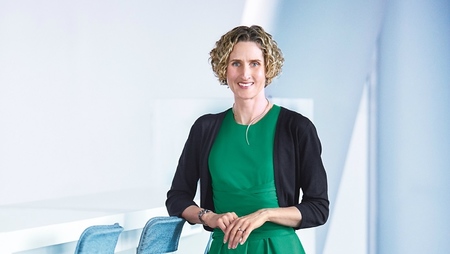
The Supervisory Board of Fresenius Management SE has unanimously appointed Rachel Empey (41) as Chief Financial Officer of Fresenius, as of August 1, 2017. In this position she will succeed Stephan Sturm (54), who has continued to serve as CFO since his appointment as Chief Executive Officer of Fresenius last year.
Rachel Empey has been Chief Financial and Strategy Officer of Telefónica Deutschland Holding AG (“Telefónica Deutschland”) since 2011. Telefónica Deutschland is listed on the Frankfurt Stock Exchange and, with a market capitalization of more than €12 billion, is a leading TecDAX constituent. Before joining the Management Board of Telefónica Deutschland, Rachel Empey held a number of key international finance and controlling positions in the Telefónica group. She started her career as an auditor at Ernst & Young and business analyst at Lucent Technologies. Rachel Empey is British, a Chartered Accountant and holds an MA (Hons) in Mathematical Sciences from the University of Oxford.
Dr. Gerd Krick, Chairman of Fresenius Management SE’s Supervisory Board, said: “We are pleased to welcome a true financial expert and highly experienced manager as our new CFO. Among all the excellent candidates for this position, Rachel Empey impressed us with her exceptional technical expertise, sound strategic thinking and successful track record. She is a great addition to our proven management team.”
Stephan Sturm said: “I am very much looking forward to working with Rachel Empey. She is going to be the perfect fit for our Management Board. Along with first-rate qualifications and skills, wide-ranging experience and an engaging personality, she will bring new insights to Fresenius from another dynamic and innovative industry.”
Rachel Empey said: “I am very excited to be joining Fresenius and taking up this tremendous professional opportunity. Fresenius has a very strong position in the healthcare industry. I look forward to contributing to the company’s continued growth and consistent success as Chief Financial Officer.”
This release contains forward-looking statements that are subject to various risks and uncertainties. Future results could differ materially from those described in these forward-looking statements due to certain factors, e.g. changes in business, economic and competitive conditions, regulatory reforms, results of clinical trials, foreign exchange rate fluctuations, uncertainties in litigation or investigative proceedings, and the availability of financing. Fresenius does not undertake any responsibility to update the forward-looking statements in this release.
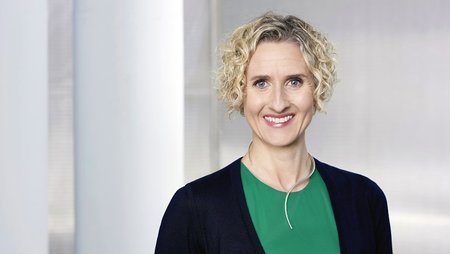
The Supervisory Board of Fresenius Management SE has unanimously appointed Rachel Empey (41) as Chief Financial Officer of Fresenius, as of August 1, 2017. In this position she will succeed Stephan Sturm (54), who has continued to serve as CFO since his appointment as Chief Executive Officer of Fresenius last year.
Rachel Empey has been Chief Financial and Strategy Officer of Telefónica Deutschland Holding AG (“Telefónica Deutschland”) since 2011. Telefónica Deutschland is listed on the Frankfurt Stock Exchange and, with a market capitalization of more than €12 billion, is a leading TecDAX constituent. Before joining the Management Board of Telefónica Deutschland, Rachel Empey held a number of key international finance and controlling positions in the Telefónica group. She started her career as an auditor at Ernst & Young and business analyst at Lucent Technologies. Rachel Empey is British, a Chartered Accountant and holds an MA (Hons) in Mathematical Sciences from the University of Oxford.
Dr. Gerd Krick, Chairman of Fresenius Management SE’s Supervisory Board, said: “We are pleased to welcome a true financial expert and highly experienced manager as our new CFO. Among all the excellent candidates for this position, Rachel Empey impressed us with her exceptional technical expertise, sound strategic thinking and successful track record. She is a great addition to our proven management team.”
Stephan Sturm said: “I am very much looking forward to working with Rachel Empey. She is going to be the perfect fit for our Management Board. Along with first-rate qualifications and skills, wide-ranging experience and an engaging personality, she will bring new insights to Fresenius from another dynamic and innovative industry.”
Rachel Empey said: “I am very excited to be joining Fresenius and taking up this tremendous professional opportunity. Fresenius has a very strong position in the healthcare industry. I look forward to contributing to the company’s continued growth and consistent success as Chief Financial Officer.”
This release contains forward-looking statements that are subject to various risks and uncertainties. Future results could differ materially from those described in these forward-looking statements due to certain factors, e.g. changes in business, economic and competitive conditions, regulatory reforms, results of clinical trials, foreign exchange rate fluctuations, uncertainties in litigation or investigative proceedings, and the availability of financing. Fresenius does not undertake any responsibility to update the forward-looking statements in this release.
Fresenius was presented yesterday with the Corporate Finance Award for the company's acquisition of Quirónsalud, Spain’s largest private hospital operator. The award is given annually by the major German business daily Börsen-Zeitung for transactions judged to be outstanding in both strategical and financial terms. Fresenius won in the Large Caps category, which groups major companies. With the Quirónsalud acquisition, the Börsen-Zeitung said, “Fresenius succeeded in making a quantum leap in the hospital business."
Fresenius was presented yesterday with the Corporate Finance Award for the company's acquisition of Quirónsalud, Spain’s largest private hospital operator. The award is given annually by the major German business daily Börsen-Zeitung for transactions judged to be outstanding in both strategical and financial terms. Fresenius won in the Large Caps category, which groups major companies. With the Quirónsalud acquisition, the Börsen-Zeitung said, “Fresenius succeeded in making a quantum leap in the hospital business."
Fresenius expects new record sales and earnings in the current business year. At the Annual General Meeting in Frankfurt today, Stephan Sturm, CEO of Fresenius, confirmed the 2017 targets. The company is forecasting sales growth of 15 to 17 percent, and an increase in net income of 19 to 21 percent1, both in constant currency. After a very strong first quarter, Fresenius raised its Group earnings guidance in early May.
In his first speech as CEO to the Annual General Meeting, Sturm stressed the link between growth and the well-being of patients: “We never let ourselves become complacent, or satisfied with the tried and tested. That is true for products and services, and it’s true for the company as a whole. This is why we want to continue growing, and will. Because that is what enables us to offer even better products and therapies. And because we are contributing to high-quality medicine that remains affordable. In future, that will remain our commitment: better medicine for more people.”
Sturm also discussed the strategically important acquisitions of the U.S. generic pharmaceuticals provider Akorn and the biosimilars business of Merck KGaA, which were announced in April: “They broaden our range of high-quality yet affordable drugs, and take us into new, attractive growth areas. The acquisitions also strengthen Fresenius as a whole. With Quirónsalud, we have expanded our therapy area, and now we are expanding our product business. Both areas are decisive for our success, and we want to grow further in both of them.”
Shareholders approved with a majority of 91.04 percent the 24th consecutive dividend increase proposed by the general partner and the Supervisory Board. The dividend was raised by 13 percent to €0.62 per share.
Shareholder majorities of 99.95 percent and 91.81 percent, respectively, approved the actions of the Management and Supervisory Boards in 2016.
At the Annual General Meeting, 70.03 percent of the subscribed capital was represented.
1 Net income attributable to shareholders of Fresenius SE & Co. KGaA; before transaction costs of ~€50 million for the acquisitions of Akorn, Inc. and Merck KGaA’s biosimilars business; before expected expenditures for the further development of Merck KGaA’s biosimilars business of ~€50 million (expected closing H2/17)
Press Release
This release contains forward-looking statements that are subject to various risks and uncertainties. Future results could differ materially from those described in these forward-looking statements due to certain factors, e.g. changes in business, economic and competitive conditions, regulatory reforms, results of clinical trials, foreign exchange rate fluctuations, uncertainties in litigation or investigative proceedings, and the availability of financing. Fresenius does not undertake any responsibility to update the forward-looking statements in this release.
Q1/2017:
• Sales: €8.4 billion (+19%, +17% in constant currency)
• EBIT: €1,216 million (+27%, +25% in constant currency)
• Net income1 : €457 million (+28%, +26% in constant currency)
1 Net income attributable to shareholders of Fresenius SE & Co. KGaA
Stephan Sturm, CEO of Fresenius, said: “Fresenius made an excellent start in 2017. All four business segments developed very well in the first quarter and continue to have healthy growth prospects. That makes us all the more optimistic as we look ahead. From this position of strength, and bolstered by strategically important acquisitions, we are building an even stronger foundation for our long-term success.”
2017 Group earnings guidance raised1,2,3
Based on the Group’s strong Q1 results and ongoing bright prospects for the remainder of the year, Fresenius raises its 2017 Group earnings guidance published in February 2017. Group net income3 on a like-for-like basis, i.e. before effects of the recently announced acquisitions at Fresenius Kabi, is now expected to grow by 19% to 21% in constant currency (previously: 17% to 20%).
Including expenditures for the further development of Merck KGaA’s biosimilars business, which is expected to be acquired in the second half of 2017, Fresenius projects net income3 growth in constant currency within the previous range of 17% to 20%.
Fresenius confirms its sales guidance. Group sales are expected to increase by 15% to 17% in constant currency.
Pro forma the acquisitions of Akorn and Merck KGaA’s biosimilars business, the net debt/EBITDA4ratio is expected to be approximately 3.3 at the end of 2017.
17% sales growth in constant currency
Group sales increased by 19% (17% in constant currency) to €8,362 million (Q1/2016: €7,015 million). Organic sales growth was 7%5. Positive currency translation effects (2%) were mainly related to the appreciation of the US-Dollar against the Euro. Divestitures had no impact on sales. Acquisitions and the €100 million agreement with the United States Departments of Veterans Affairs and Justice at Fresenius Medical Care North America (“VA agreement”) contributed 10%.
1 Before transaction costs of ~€50 million for the acquisitions of Akorn, Inc. and Merck KGaA’s biosimilars business2 Before expected expenditures for the further development of Merck KGaA’s biosimilars business of ~€50 million (expected closing H2/17)3 Net income attributable to shareholders of Fresenius SE & Co. KGaA4 Calculated at expected FY average exchange rates for both net debt and EBITDA; before transaction costs of ~€50 million; excluding further potential acquisitions5 Excluding effects of VA-agreement
Group sales by region:
26% net income1 growth in constant currency
Group EBITDA increased by 26% (23% in constant currency) to €1,560 million (Q1/2016: €1,241 million). Group EBIT increased by 27% (25% in constant currency) to €1,216 million (Q1/2016: €959 million). The EBIT margin increased to 14.5% (Q1/2016: 13.7%).
Group net interest increased to -€157 million (Q1/2016: -€152 million), mainly due to the financing of the Quirónsalud acquisition.
The Group tax rate increased to 29.1% (Q1/2016: 28.4%), mainly driven by the higher proportion of U.S. pre-tax income, primarily due to the VA-agreement.
Noncontrolling interest increased to €294 million (Q1/2016: €220 million), of which 96% was attributable to the noncontrolling interest in Fresenius Medical Care.
Group net income1 increased by 28% (26% in constant currency) to €457 million (Q1/2016: €358 million). The VA-agreement increased net income1 by €18 million or 5%-points. Earnings per share1 increased by 28% (25% in constant currency) to €0.83 (Q1/2016: €0.65).
1 Net income attributable to shareholders of Fresenius SE & Co. KGaA
Continued investment in growth
Spending on property, plant and equipment was €328 million (Q1/2016: €315 million), primarily for the modernization and expansion of dialysis clinics, production facilities and hospitals. Total acquisition spending of €6,083 million (Q1/2016: €204 million) was mainly related to the acquisition of Quirónsalud.
Strong operating cash flow
Operating cash flow increased by 42% to €476 million (Q1/2016: €336 million), mainly driven by the excellent development at Fresenius Kabi and Fresenius Helios. The cash flow margin was 5.7% (Q1/2016: 4.8%).
Free cash flow before acquisitions and dividends increased to €148 million (Q1/2016: €2 million). Free cash flow after acquisitions and dividends was -€5,393 million
(Q1/2016: -€241 million).
Solid balance sheet structure
The Group’s total assets increased by 17% (17% in constant currency) to €54,418 million (Dec. 31, 2016: €46,697 million), mainly due to the acquisition of Quirónsalud. Current assets grew by 11% (12% in constant currency) to €13,077 million (Dec. 31, 2016: €11,744 million). Non-current assets increased by 18% (19% in constant currency) to €41,341 million (Dec. 31, 2016: €?34,953 million).
Total shareholders’ equity grew by 5% (6% in constant currency) to €21,921 million (Dec. 31, 2016: €20,849 million). The equity ratio was 40.3% (Dec. 31, 2016: 44.6%).
Group debt increased by 37% (37% in constant currency) to €20,210 million (Dec. 31, 2016: €?14,780 million), mainly driven by the acquisition financing of Quirónsalud. As of March 31, 2017, the net debt/EBITDA ratio was 2.981,3 (Dec. 31, 2016: 2.331,3/3.091,2,3).
1 Net debt and EBITDA at LTM average exchange rates2 Pro forma Quirónsalud3 Pro forma acquisitions
Increased number of employees
As of March 31, 2017, the number of employees increased by 13% to 263,957 (Dec. 31, 2016: 232,873).
Business segments
Fresenius Medical Care
Fresenius Medical Care is the world's largest provider of products and services for individuals with chronic kidney failure. As of March 31, 2017, Fresenius Medical Care was treating 310,473 patients in 3,654 dialysis clinics. Along with its core business, the company seeks to expand the range of medical services in the field of care coordination.
• 12% sales growth in constant currency (10% excluding the VA-agreement)
• 41% net income growth1 in constant currency (14% excluding the VA-agreement)
• 2017 outlook confirmed
1 Net income attributable to shareholders of Fresenius Medical Care AG & Co. KGaA
Sales increased by 16% (12% in constant currency) to €4,548 million (Q1/2016: €3,916 million). Organic sales growth was 8%. Acquisitions/divestitures and the VA agreement contributed 4% in total.
Health Care services sales (dialysis services and care coordination) increased by 18% (14% in constant currency) to €3,769 million (Q1/2016: €3,199 million). Product sales increased by 8% (6% in constant currency) to €779 million (Q1/2016: €718 million).
In North America, sales increased by 18% (14% excluding the VA-agreement) to €3,375 million (Q1/2016: €2,862 million). Health Care services sales grew by 19% to €3,165 million (Q1/2016: €2,670 million). Product sales increased by 9% to €210 million (Q1/2016: €192 million).
Sales outside North America increased by 11% (8% in constant currency) to €1,169 million (Q1/2016: €1,051 million). Health Care services sales increased by 14% (10% in constant currency) to €604 million (Q1/2016: €528 million). Product sales increased by 8% (6% in constant currency) to €564 million (Q1/2016: €523 million).
EBIT increased by 31% (28% in constant currency) to €651 million (Q1/2016: €497 million). The EBIT margin was 14.3% (Q1/2016: 12.7%). Excluding the VA-agreement (€99 million) EBIT increased by 11% (8% in constant currency).
Net income1 increased by 45% (41% in constant currency) to €308 million (Q1/2016: €213 million). Excluding the VA-agreement (€59 million) net income1 increased by 17% (14% in constant currency).
Operating cash flow increased by 4% to €170 million (Q1/2016: €163 million). The cash flow margin was 3.7% (Q1/2016: 4.2%). The VA-agreement partially offset the impact of seasonality in invoicing at Fresenius Medical Care in North America. Fresenius Medical Care expects that this timing effect will have no meaningful impact on the full year 2017.
Fresenius Medical Care confirms its outlook for 2017. The company expects sales to grow by 8% to 10%2 in constant currency. Net income1,2 is expected to increase by 7% to 9% in constant currency.
1 Net income attributable to shareholders of Fresenius Medical Care AG & Co. KGaA2 Excluding effects of VA-agreementFor further information, please see Fresenius Medical Care’s press release at www.freseniusmedicalcare.com.
Fresenius Kabi
Fresenius Kabi offers intravenously administered generic drugs, clinical nutrition and infusion therapies for seriously and chronically ill patients in the hospital and outpatient environments. The company is also a leading supplier of medical devices and transfusion technology products.
• 7% organic sales growth; positive contributions from all regions
• 2% constant currency EBIT growth despite very strong PY quarter
• 2017 outlook raised: 6% to 8%2,3, EBIT growth in constant currency expected
Sales increased by 9% (organic growth: 7%) to €1,604 million (Q1/2016: €1,470 million). Positive currency translation effects (2%) were mainly related to the appreciation of the US-Dollar against the Euro. Acquisitions/divestitures had no impact on sales.
Sales in Europe increased by 6% (organic growth: 7%) to €544 million (Q1/2016: €512 million). Currency translation effects reduced sales by 1%.
Sales in North America increased by 7% (organic growth: 4%) to €619 million (Q1/2016: €576 million).
Sales in Asia-Pacific increased by 10% (organic growth: 10%) to €280 million (Q1/2016: €254 million).
Sales in Latin America/Africa increased by 26% to €161 million (Q1/2016: €128 million). Organic sales growth was 14%, mainly due to inflation-driven price increases.
EBIT increased by 3% (2% in constant currency) to €313 million (Q1/2016: €303 million). The EBIT margin was 19.5% (Q1/2016: 20.6%).
Net income1 increased by 10% (9% in constant currency) to €191 million (Q1/2016: €173 million).
Operating cash flow increased by 51% to €192 million (Q1/2016: €127 million) driven by strong operating results and improved net working capital. The margin increased to 12.0% (Q1/2016: 8.6%).
Fresenius Kabi raises its outlook for 2017 and now expects EBIT growth in constant currency of 6% to 8%2,3, (previously 5% to 7%). The company confirms its guidance of 5% to 7% organic sales growth.
1 Net income attributable to shareholders of Fresenius SE & Co. KGaA2 Before transaction costs of ~€50 million for the acquisitions of Akorn, Inc. and Merck KGaA’s biosimilars business3 Before expected expenditures for the further development of Merck KGaA’s biosimilars business of ~€50 million (expected closing H2/17)
Fresenius Helios
Fresenius Helios is Europe's leading private hospital operator. The company comprises HELIOS Kliniken in Germany and Quirónsalud in Spain. HELIOS Kliniken operates 112 hospitals, thereof 88 acute care clinics and 24 post-acute care clinics, and treats more than 5.2 million patients annually. Quirónsalud operates 44 hospitals, 43 outpatient centers and around 300 occupational risk prevention centers, and treats approximately 9.7 million patiens per year.
• 5% organic sales growth
• 60% EBIT increase (14% excluding Quirónsalud)
• 2017 outlook confirmed
Sales increased by 41% (organic growth: 5%) to €2,018 million (Q1/2016: €1,435 million). Acquisitions, mainly Quirónsalud, increased sales by 36%. Quirónsalud is consolidated since February 1, 2017. Sales of Quirónsalud were €490 million in February and March 2017.
Sales of HELIOS Kliniken2 increased by 6% (organic growth: 5%) to €1,528 million.
EBIT grew by 60% to €255 million (Q1/2016: €159 million). The EBIT margin increased to 12.6% (Q1/2016: 11.1%).
EBIT of HELIOS Kliniken2 increased by 14% to €181 million with a margin of 11.8% (Q1/2016: 11.1%). EBIT of Quirónsalud was €74 million with a margin of 15.1%.
Net income1 increased by 46% to €181 million (Q1/2016: €124 million).
1 Net income attributable to shareholders of Fresenius SE & Co. KGaA2 HELIOS Kliniken Germany, excluding Quirónsalud
Operating cash flow increased by 179% to €184 million (Q1/2016: €66 million) driven by the first time consolidation of Quirónsalud and good operating results. The margin increased to 9.1% (Q1/2016: 4.6%).
Fresenius Helios confirms its outlook for 2017 and projects organic sales growth of 3% to 5%1 and sales of ~€8.6 billion (thereof Quirónsalud: ~€2.5 billion2). EBIT is expected to increase to €1,020 to €1,070 million (thereof Quirónsalud: €300 to 320 million2).
1 HELIOS Kliniken Germany, excluding Quirónsalud2 Quirónsalud consolidated for 11 months
Fresenius Vamed
Fresenius Vamed manages projects and provides services for hospitals and other health care facilities worldwide. The portfolio ranges along the entire value chain: from project development, planning, and turnkey construction, via maintenance and technical management, to total operational management.
• 2% organic sales growth driven by service business
• Project business with strong order intake of €220 million
• 2017 outlook confirmed
Sales increased by 2% (organic growth: 2%) to €223 million (Q1/2016: €218 million). Sales in the project business decreased by 9% to €77 million (Q1/2016: €85 million). Sales in the service business grew by 10% to €146 million (Q1/2016: €133 million).
EBIT decreased by 14% to €6 million (Q1/2016: €7 million). The EBIT margin decreased to 2.7% (Q1/2016: 3.2%).
Net income1 decreased by 20% to €4 million (Q1/2016: €5 million).
Order intake reached a strong €220 million, could not quite match the previous year’s excellent level (Q1/2016: €237 million). As of March 31, 2017, order backlog grew to a record €2,104 million (December 31, 2016: €1,961 million).
Fresenius Vamed confirms its outlook for 2017 and expects both organic sales growth and EBIT growth in the range of 5% to 10%.
1 Net income attributable to shareholders of VAMED AG
Conference Call
As part of the publication of the results for the first quarter of 2017, a conference call will be held on May 3, 2017 at 2 p.m. CEDT (8 a.m. EDT). All investors are cordially invited to follow the conference call in a live broadcast over the Internet at www.fresenius.com/investors. Following the call, a replay will be available on our website.
# # #
For additional information on the performance indicators used please refer to our website https://www.fresenius.com/alternative-performance-measures.
This release contains forward-looking statements that are subject to various risks and uncertainties. Future results could differ materially from those described in these forward-looking statements due to certain factors, e.g. changes in business, economic and competitive conditions, regulatory reforms, results of clinical trials, foreign exchange rate fluctuations, uncertainties in litigation or investigative proceedings, and the availability of financing. Fresenius does not undertake any responsibility to update the forward-looking statements in this release.
Q1/2017:
• Sales: €8.4 billion (+19%, +17% in constant currency)
• EBIT: €1,216 million (+27%, +25% in constant currency)
• Net income1: €457 million (+28%, +26% in constant currency)
1 Net income attributable to shareholders of Fresenius SE & Co. KGaA
Stephan Sturm, CEO of Fresenius, said: “Fresenius made an excellent start in 2017. All four business segments developed very well in the first quarter and continue to have healthy growth prospects. That makes us all the more optimistic as we look ahead. From this position of strength, and bolstered by strategically important acquisitions, we are building an even stronger foundation for our long-term success.”
2017 Group earnings guidance raised1,2,3
Based on the Group’s strong Q1 results and ongoing bright prospects for the remainder of the year, Fresenius raises its 2017 Group earnings guidance published in February 2017. Group net income3 on a like-for-like basis, i.e. before effects of the recently announced acquisitions at Fresenius Kabi, is now expected to grow by 19% to 21% in constant currency (previously: 17% to 20%).
Including expenditures for the further development of Merck KGaA’s biosimilars business, which is expected to be acquired in the second half of 2017, Fresenius projects net income3 growth in constant currency within the previous range of 17% to 20%1.
Fresenius confirms its sales guidance. Group sales are expected to increase by 15% to 17% in constant currency.
Pro forma the acquisitions of Akorn and Merck KGaA’s biosimilars business, the net debt/EBITDA4 ratio is expected to be approximately 3.3 at the end of 2017.
17% sales growth in constant currency
Group sales increased by 19% (17% in constant currency) to €8,362 million (Q1/2016: €7,015 million). Organic sales growth was 7%5 . Positive currency translation effects (2%) were mainly related to the appreciation of the US-Dollar against the Euro. Divestitures had no impact on sales. Acquisitions and the €100 million agreement with the United States Departments of Veterans Affairs and Justice at Fresenius Medical Care North America (“VA agreement”) contributed 10%.
1Before transaction costs of ~€50 million for the acquisitions of Akorn, Inc. and Merck KGaA’s biosimilars business
2Before expected expenditures for the further development of Merck KGaA’s biosimilars business of ~€50 million (expected closing H2/17)
3Net income attributable to shareholders of Fresenius SE & Co. KGaA
4Calculated at expected FY average exchange rates for both net debt and EBITDA; before transaction costs of ~€50 million; excluding further potential acquisitions
5Excluding effects of VA-agreement
Group sales by region:


1 Including effects of VA-agreement
26% net income1 growth in constant currency
Group EBITDA increased by 26% (23% in constant currency) to €1,560 million (Q1/2016: €1,241 million). Group EBIT increased by 27% (25% in constant currency) to €1,216 million (Q1/2016: €959 million). The EBIT margin increased to 14.5% (Q1/2016: 13.7%).
Group net interest increased to -€157 million (Q1/2016: -€152 million), mainly due to the financing of the Quirónsalud acquisition.
The Group tax rate increased to 29.1% (Q1/2016: 28.4%), mainly driven by the higher proportion of U.S. pre-tax income, primarily due to the VA-agreement.
Noncontrolling interest increased to €294 million (Q1/2016: €220 million), of which 96% was attributable to the noncontrolling interest in Fresenius Medical Care.
Group net income1 increased by 28% (26% in constant currency) to €457 million (Q1/2016: €358 million). The VA-agreement increased net income1 by €18 million or 5%-points. Earnings per share1 increased by 28% (25% in constant currency) to €0.83 (Q1/2016: €0.65).
1 Net income attributable to shareholders of Fresenius SE & Co. KGaA
Continued investment in growth
Spending on property, plant and equipment was €328 million (Q1/2016: €315 million), primarily for the modernization and expansion of dialysis clinics, production facilities and hospitals. Total acquisition spending of €6,083 million (Q1/2016: €204 million) was mainly related to the acquisition of Quirónsalud.
Strong operating cash flow
Operating cash flow increased by 42% to €476 million (Q1/2016: €336 million), mainly driven by the excellent development at Fresenius Kabi and Fresenius Helios. The cash flow margin was 5.7% (Q1/2016: 4.8%).
Free cash flow before acquisitions and dividends increased to €148 million (Q1/2016: €2 million). Free cash flow after acquisitions and dividends was -€5,393 million
(Q1/2016: -€241 million).
Solid balance sheet structure
The Group’s total assets increased by 17% (17% in constant currency) to €54,418 million (Dec. 31, 2016: €46,697 million), mainly due to the acquisition of Quirónsalud. Current assets grew by 11% (12% in constant currency) to €13,077 million (Dec. 31, 2016: €11,744 million). Non-current assets increased by 18% (19% in constant currency) to €41,341 million (Dec. 31, 2016: € 34,953 million).
Total shareholders’ equity grew by 5% (6% in constant currency) to €21,921 million (Dec. 31, 2016: €20,849 million). The equity ratio was 40.3% (Dec. 31, 2016: 44.6%).
Group debt increased by 37% (37% in constant currency) to €20,210 million (Dec. 31, 2016: € 14,780 million), mainly driven by the acquisition financing of Quirónsalud. As of March 31, 2017, the net debt/EBITDA ratio was 2.981,3 (Dec. 31, 2016: 2.331,3/3.091,2,3).
1Net debt and EBITDA at LTM average exchange rates
2Pro forma Quirónsalud
3Pro forma acquisitions
Increased number of employees
As of March 31, 2017, the number of employees increased by 13% to 263,957 (Dec. 31, 2016: 232,873).
Business segments
Fresenius Medical Care
Fresenius Medical Care is the world's largest provider of products and services for individuals with chronic kidney failure. As of March 31, 2017, Fresenius Medical Care was treating 310,473 patients in 3,654 dialysis clinics. Along with its core business, the company seeks to expand the range of medical services in the field of care coordination.
 • 12% sales growth in constant currency (10% excluding the VA-agreement)
• 12% sales growth in constant currency (10% excluding the VA-agreement)
• 41% net income growth1 in constant currency (14% excluding the VA-agreement)
• 2017 outlook confirmed
1 Net income attributable to shareholders of Fresenius Medical Care AG & Co. KGaA
Sales increased by 16% (12% in constant currency) to €4,548 million (Q1/2016: €3,916 million). Organic sales growth was 8%. Acquisitions/divestitures and the VA agreement contributed 4% in total.
Health Care services sales (dialysis services and care coordination) increased by 18% (14% in constant currency) to €3,769 million (Q1/2016: €3,199 million). Product sales increased by 8% (6% in constant currency) to €779 million (Q1/2016: €718 million).
In North America, sales increased by 18% (14% excluding the VA-agreement) to €3,375 million (Q1/2016: €2,862 million). Health Care services sales grew by 19% to €3,165 million (Q1/2016: €2,670 million). Product sales increased by 9% to €210 million (Q1/2016: €192 million).
Sales outside North America increased by 11% (8% in constant currency) to €1,169 million (Q1/2016: €1,051 million). Health Care services sales increased by 14% (10% in constant currency) to €604 million (Q1/2016: €528 million). Product sales increased by 8% (6% in constant currency) to €564 million (Q1/2016: €523 million).
EBIT increased by 31% (28% in constant currency) to €651 million (Q1/2016: €497 million). The EBIT margin was 14.3% (Q1/2016: 12.7%). Excluding the VA-agreement (€99 million) EBIT increased by 11% (8% in constant currency).
Net income1 increased by 45% (41% in constant currency) to €308 million (Q1/2016: €213 million). Excluding the VA-agreement (€59 million) net income1 increased by 17% (14% in constant currency).
Operating cash flow increased by 4% to €170 million (Q1/2016: €163 million). The cash flow margin was 3.7% (Q1/2016: 4.2%). The VA-agreement partially offset the impact of seasonality in invoicing at Fresenius Medical Care in North America. Fresenius Medical Care expects that this timing effect will have no meaningful impact on the full year 2017.
Fresenius Medical Care confirms its outlook for 2017. The company expects sales to grow by 8% to 10%2 in constant currency. Net income1,2 is expected to increase by 7% to 9% in constant currency.
1Net income attributable to shareholders of Fresenius Medical Care AG & Co. KGaA
2Excluding effects of VA-agreement
For further information, please see Fresenius Medical Care’s press release at www.freseniusmedicalcare.com.
Fresenius Kabi
Fresenius Kabi offers intravenously administered generic drugs, clinical nutrition and infusion therapies for seriously and chronically ill patients in the hospital and outpatient environments. The company is also a leading supplier of medical devices and transfusion technology products.
• 7% organic sales growth; positive contributions from all regions
• 2% constant currency EBIT growth despite very strong PY quarter
• 2017 outlook raised: 6% to 8%2,3, EBIT growth in constant currency expected
Sales increased by 9% (organic growth: 7%) to €1,604 million (Q1/2016: €1,470 million). Positive currency translation effects (2%) were mainly related to the appreciation of the US-Dollar against the Euro. Acquisitions/divestitures had no impact on sales.
Sales in Europe increased by 6% (organic growth: 7%) to €544 million (Q1/2016: €512 million). Currency translation effects reduced sales by 1%.
Sales in North America increased by 7% (organic growth: 4%) to €619 million (Q1/2016: €576 million).
Sales in Asia-Pacific increased by 10% (organic growth: 10%) to €280 million (Q1/2016: €254 million).
Sales in Latin America/Africa increased by 26% to €161 million (Q1/2016: €128 million). Organic sales growth was 14%, mainly due to inflation-driven price increases.
EBIT increased by 3% (2% in constant currency) to €313 million (Q1/2016: €303 million). The EBIT margin was 19.5% (Q1/2016: 20.6%).
Net income1 increased by 10% (9% in constant currency) to €191 million (Q1/2016: €173 million).
Operating cash flow increased by 51% to €192 million (Q1/2016: €127 million) driven by strong operating results and improved net working capital. The margin increased to 12.0% (Q1/2016: 8.6%).
Fresenius Kabi raises its outlook for 2017 and now expects EBIT growth in constant currency of 6% to 8%2,3, (previously 5% to 7%). The company confirms its guidance of 5% to 7% organic sales growth.
1Net income attributable to shareholders of Fresenius SE & Co. KGaA
2Before transaction costs of ~€50 million for the acquisitions of Akorn, Inc. and Merck KGaA’s biosimilars business
3Before expected expenditures for the further development of Merck KGaA’s biosimilars business of ~€50 million (expected closing H2/17)
Fresenius Helios
Fresenius Helios is Europe's leading private hospital operator. The company comprises HELIOS Kliniken in Germany and Quirónsalud in Spain. HELIOS Kliniken operates 112 hospitals, thereof 88 acute care clinics and 24 post-acute care clinics, and treats more than 5.2 million patients annually. Quirónsalud operates 44 hospitals, 43 outpatient centers and around 300 occupational risk prevention centers, and treats approximately 9.7 million patiens per year.

• 5% organic sales growth
• 60% EBIT increase (14% excluding Quirónsalud)
• 2017 outlook confirmed
Sales increased by 41% (organic growth: 5%) to €2,018 million (Q1/2016: €1,435 million). Acquisitions, mainly Quirónsalud, increased sales by 36%. Quirónsalud is consolidated since February 1, 2017. Sales of Quirónsalud were €490 million in February and March 2017.
Sales of HELIOS Kliniken2 increased by 6% (organic growth: 5%) to €1,528 million.
EBIT grew by 60% to €255 million (Q1/2016: €159 million). The EBIT margin increased to 12.6% (Q1/2016: 11.1%).
EBIT of HELIOS Kliniken2 increased by 14% to €181 million with a margin of 11.8% (Q1/2016: 11.1%). EBIT of Quirónsalud was €74 million with a margin of 15.1%.
Net income1 increased by 46% to €181 million (Q1/2016: €124 million).
1 Net income attributable to shareholders of Fresenius SE & Co. KGaA
2 HELIOS Kliniken Germany, excluding Quirónsalud
Operating cash flow increased by 179% to €184 million (Q1/2016: €66 million) driven by the first time consolidation of Quirónsalud and good operating results. The margin increased to 9.1% (Q1/2016: 4.6%).
Fresenius Helios confirms its outlook for 2017 and projects organic sales growth of 3% to 5%1 and sales of ~€8.6 billion (thereof Quirónsalud: ~€2.5 billion2). EBIT is expected to increase to €1,020 to €1,070 million (thereof Quirónsalud: €300 to 320 million2).
1 HELIOS Kliniken Germany, excluding Quirónsalud
2 Quirónsalud consolidated for 11 months
Fresenius Vamed
Fresenius Vamed manages projects and provides services for hospitals and other health care facilities worldwide. The portfolio ranges along the entire value chain: from project development, planning, and turnkey construction, via maintenance and technical management, to total operational management.

• 2% organic sales growth driven by service business
• Project business with strong order intake of €220 million
• 2017 outlook confirmed
Sales increased by 2% (organic growth: 2%) to €223 million (Q1/2016: €218 million). Sales in the project business decreased by 9% to €77 million (Q1/2016: €85 million). Sales in the service business grew by 10% to €146 million (Q1/2016: €133 million).
EBIT decreased by 14% to €6 million (Q1/2016: €7 million). The EBIT margin decreased to 2.7% (Q1/2016: 3.2%).
Net income1 decreased by 20% to €4 million (Q1/2016: €5 million).
Order intake reached a strong €220 million, could not quite match the previous year’s excellent level (Q1/2016: €237 million). As of March 31, 2017, order backlog grew to a record €2,104 million (December 31, 2016: €1,961 million).
Fresenius Vamed confirms its outlook for 2017 and expects both organic sales growth and EBIT growth in the range of 5% to 10%.
1 Net income attributable to shareholders of VAMED AG
Conference Call
As part of the publication of the results for the first quarter of 2017, a conference call for analysts and investors will be held on May 3, 2017 at 2 p.m. CEDT (8 a.m. EDT). You are cordially invited to follow the conference call in a live broadcast over the Internet at www.fresenius.com/media-calendar. Following the call, a replay will be available on our website.
For additional information on the performance indicators used please refer to our website https://www.fresenius.com/alternative-performance-measures.
This release contains forward-looking statements that are subject to various risks and uncertainties. Future results could differ materially from those described in these forward-looking statements due to certain factors, e.g. changes in business, economic and competitive conditions, regulatory reforms, results of clinical trials, foreign exchange rate fluctuations, uncertainties in litigation or investigative proceedings, and the availability of financing. Fresenius does not undertake any responsibility to update the forward-looking statements in this release.
Following Fresenius’ announcement to acquire Akorn, Inc. and Merck KGaA’s biosimilars business, the rating agencies Standard & Poor’s (BBB-, stable), Moody’s (Baa3, stable) and Fitch (BBB-, stable) confirm the corporate credit ratings of Fresenius to be unaffected.
Following Fresenius’ announcement to acquire Akorn, Inc. and Merck KGaA’s biosimilars business, the rating agencies Standard & Poor’s (BBB-, stable), Moody’s (Baa3, stable) and Fitch (BBB-, stable) confirm the corporate credit ratings of Fresenius to be unaffected.
Pagination
- Previous page
- Page 27
- Next page


